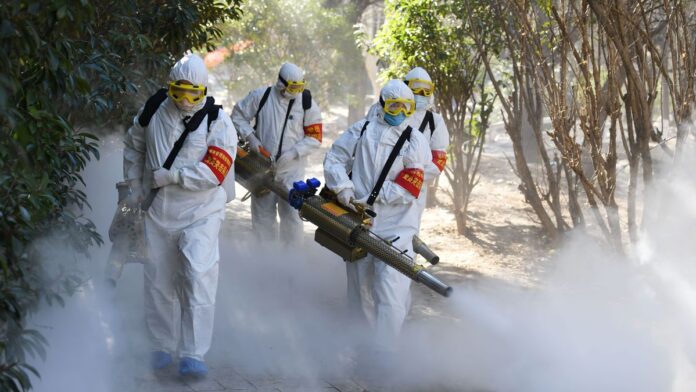Over the last few weeks, I have read countless stories that seem to suggest that coronavirus is the disease that would finally bring Africa to its knees. First, Melinda Gates, wife of billionaire Bill Gates said she feared bodies will be littered on the streets of Africa if the pandemic peaks on the continent.
Then, on Thursday, April 17, the World Health Organisation (WHO) predicted that Africa could become the next epicentre of the coronavirus pandemic.
It is easy to come to such a conclusion because this is a continent where governments spend more on SUVs, per diems coupled with corruption scandals than hospital beds.
Coronavirus has been devastating and has crashed human activities more than any other pandemic. But there seem to be underlying positives we can take amidst the storm sweeping across the world today. Coronavirus has provided us with an opportunity we must not waste.
For decades, our leaders have neglected the health sector, leaving the poor and vulnerable to their fate, knowing very well they can jet off to the state-of-the-art hospitals in Europe and America for healthcare.
But this pandemic has tested the resilience of our nation’s leadership depth, economy, public health system, the social welfare system and humanitarian intellect, in some aspects we have failed, in other aspects we are hanging on by a thread, so it is important our leaders and all of us take the many lessons from this pandemic seriously.
I once lived in a House at Mamprobi where I had to walk for 15 minutes to reach the nearest toilet facility. When I moved to live in Swedru briefly in the early 2000s, I lived in a compound house that had over 150 tenants at the time, unfortunately, the nearest toilet facility was two miles away. How can anyone living in a house like I did keep safe with this highly infectious disease around the corner.
265 million people globally facing looming hunger due to covid-19
Sadly, nothing has been done over the years to improve the lives of people living in such conditions.
Almost all markets in this country are cramped up with no or broken washroom facilities. In some areas at Chorkor, there are families of eight living in a small single room, how can people keep to social distancing measures to fight COVID-19?
A report by the Ghana Health Service in 2017, stated that there are 3,365 doctors, 14,791 community health nurses, 7,662 midwives, 619 pharmacists, and 13,231 registered general nurses.
This means the ratio of doctors per population in Ghana is 1:8481 which is woefully inadequate for a population of over 29 million citizens.
The average physician density in sub-Saharan Africa stands at two doctors per 10,000 people. South Africa – one of the African nations with better infrastructure – has nine doctors per 10000 people. Nigeria, the most populous nation in Africa, has a doctor to population ratio of three doctors to 10,000 people and only 163 ventilators.
The WHO in a report regarding the status of health infrastructure across the African continent revealed woefully inadequate physical health infrastructure. The number of hospital beds, including intensive care unit (ICU) beds, are limited, while in some countries they are non-existent.
South Africa has less than 1,000 ICU beds, 17 million people in Malawi have access to only 25 ICU beds. Ghana with a population of 29 million has access to only 200 ICU beds.
Also, Ghana has only two world-class laboratories for a country with 16 regions. Imagine if we had at least six, what that could have done for our enhanced testing for COVID-19.
Emergency medical systems across Ghana and several other African countries can barely deal with those needing care. Maybe coronavirus is what will force our leaders to start thinking nationally and investing in the right places.
Outrage as French doctors say covid-19 cure should first be tested in Africa
Globally over 2.6 million people are battling this virus, however, it seems Africa is doing well or let me say the virus has somehow shown mercy on us. In total the continent has just around 23, 000 cases and with a little over 1000 deaths. In contrast, Europe has lost over 100, 000 of its citizens while the United States of America – with almost 900, 000 cases – has lost over 40, 000 of its people to this invisible enemy.
Investing in quality health infrastructure makes sense from both economic and social perspectives. Indeed, there is enough evidence that shows that investments in health infrastructure create an avenue for resilient societies and drive inclusive growth. While our investments henceforth must be targeted and well defined, we must also strengthen our human resource capacity.
We failed to take the lessons from the Ebola epidemic serious; we just cannot afford to do that again if we survive this pandemic.
At the beginning of the Ebola epidemic in 2014, fear and panic prompted some African governments to pay attention to shoring up their health systems but when the Ebola virus decided to take leave of us – at least until it returned in some African countries – we returned to business as usual.
We cannot afford to go back to business as usual and pretend there will never be another pandemic, maybe the next one will not have a 5% mortality rate, maybe it will be 70%, maybe the next pandemic will not start in Wuhan, China but maybe in Ghana or Nigeria.
Like every other adversity that the world has faced, the COVID-19 pandemic will end, it will be defeated no matter how long it takes, the world will survive this and our lives will return to normal. We will shake hands, hug and kiss again but our leaders must take the many lessons seriously.



